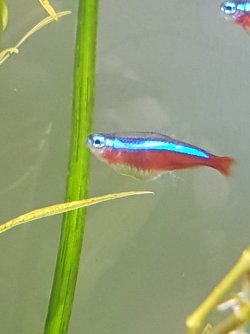ella777
Fish Crazy
One of my cardinal tetras is extremely fat. I dont know if its pregnant or just very fat. I fed them today (bloodworms, granules and flakes)
He looks like he might explode.
3 of them look fat but none as big as him.
The fatter ones seem to be breathing quite quickly as well.
I attached a picture of the largest one
He looks like he might explode.
3 of them look fat but none as big as him.
The fatter ones seem to be breathing quite quickly as well.
I attached a picture of the largest one


